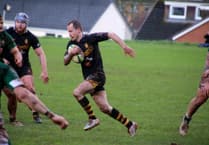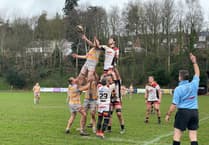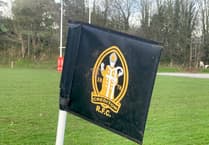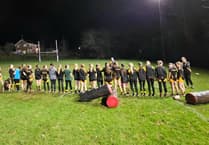AFTER the successes of the 1975-76 season the Club planned for the Centenary Celebrations which would follow three years later.
The Quins continued to be successful and for some 15 years there were only a handful of seasons when less than half the games were won.
Generally, the Club was going from strength-to-strength and with the First XV playing in the region of 40 to 45 games each season, regular rugby for the Quins was essential as, on average, 37 players would don the first team shirt each season.
Equally important though was the regularity with which the Third XV were playing for these players also had a role to fill when players were taken from the Seconds, the Third team players would step up and on many occasions would hold their place.
Where perhaps rugby had failed to address the problem of recruitment and retention of players was that there was nothing tangible for Clubs to play for.
Certainly there were Merit Tables and County Cup Competitions but these games only affected the top sides.
The 1979-80 season saw the introduction of the Devon Merit Tables, a competition to cater for the First XV’s of Clubs like ourselves.
Exeter were already playing in National Merit Table C whilst Barnstaple and Brixham were in the South West Merit Table. As a competition it was fine and it ran for nine seasons during which we finished fourth on four occasions and second in its final year 1986-87.
The following season was the first year of league rugby and Crediton were put in the Cornwall and Devon League. Of course this meant that the Merit Tables had come to a close at least for the time being.
Throughout the County, Clubs were pushing for a competition for Second XV’s and in 1992 saw the start of the Devon Merit Tables. The competition, sponsored by Whitbread, was strictly for Second XV’s and was split into two divisions, A and B, with promotion and relegation.
We were placed in Division A along with Bideford, Exeter Saracens, Exmouth, Ivybridge, Newton Abbot, Okehampton, Paignton, Sidmouth, South Molton, Teignmouth, and Tiverton.
The games were based on one fixture between each of the Clubs and positions calculated on a percentage basis. In that first season we finished in a reasonable fifth place.
The next two seasons were even better as we finished as runners-up on both occasions followed by a fourth place finish. The next three seasons did not fare so well finishing eighth, 14th (out of 16) and a ninth place saw in the new millennium.
The first full season of the new millennium saw an enormous change in fortune and was a season that would compare favourably with any other, certainly post War.
To make life more difficult, this was also the season that was badly affected by the Foot and Mouth disease but nonetheless, rugby continued and both the Firsts and Seconds were enjoying huge success, in fact so successful were both teams that some inter club rivalry developed, reminiscent of the 1975-76 season of 1,000 points.
The Quins were almost unstoppable throughout the season which began with a 63-5 victory at Devonport Services, followed by a 32-3 victory over Torquay, neither game being Merit Table fixtures. The opening game in the Merit Table saw Exmouth Seconds visit Blagdon, the game ending in a comfortable 39-3 win for the Quins. That was actually the second lowest score in any of our Merit Table games.
Newton Abbot were defeated 46-10, Kingsbridge 54-6, Exeter Saracens 55-12, South Molton 56-0, Paignton 43-0, Okehampton 72-0, Sidmouth 80-0, Tavistock 27-7, Bideford 40-0 and Withycombe 86-0 were the complete results for the Merit Table.
Remarkably, only two tries were conceded and a mere 38 points conceded in total. The Quins scored on average 54 points per game and completed the Merit Table programme with a 100 per cent record, a feat that had never been achieved before or since.
In total, the Quins that season broke the record for points scored, a total of 1,429 at an average of 49 points per game. They conceded only 206 points, an average of seven points per game.
Steve Saunders led the side, his second season as Quins Captain and he played in 26 of the 29 games, Matt Cridge only missed one second team game, Mike Grigg 26, Danny Howard, Nic LeCharpentier, Lee McKie and Morne Scheepers all played in 25, Stuart Crocker 24, Matt Chiverton 23, Graham Phare 21, Shaun Davey and Paul Nixon 20, Andy Bluff and John Leyman 19.
With so many players playing 75 per cent of the games or more, selection was consistent and there were not too many changes week-to-week.
There were of course numerous tries scored during the season and Morne Scheepers led the way with 31, plus 57 conversions and seven penalties for a total of 290 points. Danny Howard scored 25, Stuart Crocker and Nic LeCharpentier 20 apiece, Graham Phare 18.
In total 47 players turned out for the Quins during the season of which 28 also played in the First XV.
The last statistic rather proves the point that for two sides to be successful then strength in depth is a necessity and certainly for that season we had it.
The final stat for the season and one which should not be overlooked is that the Third XV won 16 of their 19 games and indeed 16 players from the Thirds also played in the Seconds, again proving the value of the Third XV.
So, what did become of the First XV? With skipper Shane Bayley at the helm, they too won the Devon and Cornwall league, 17 wins from 20 games, we won it having played two fewer games than runners-up Withycombe with 35 points to their 34.
As we moved further into the new century, the Quins enjoyed further success and for the next two seasons finished as runners up although that was really as good as it got.
In 2006-07, the South West Merit Table disbanded and Barnstaple, along with Brixham were allowed into the Merit Table along with Devonport.
We actually finished a respectable sixth in that season but the following year finished bottom and were relegated to Merit Table Two.
By now though the Merit Table structure had changed to three Divisions in order to allow Third XV’s to join and so Crediton Thirds also appeared in a Merit Table.
The lower tier was split into two, North East and South West and of course we were in the North East. The real difficulty for the Thirds though was that there were some Second XV’s in the same Table and so life was tough. They too though had some huge successes and enjoyed a tremendous spirit, a little more of that next week.
Paul Harris




